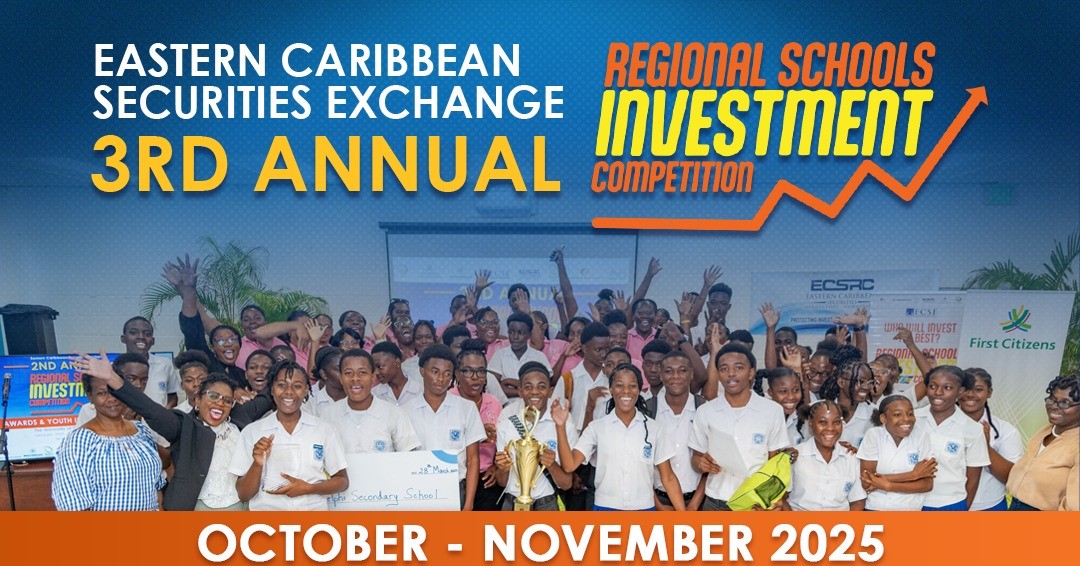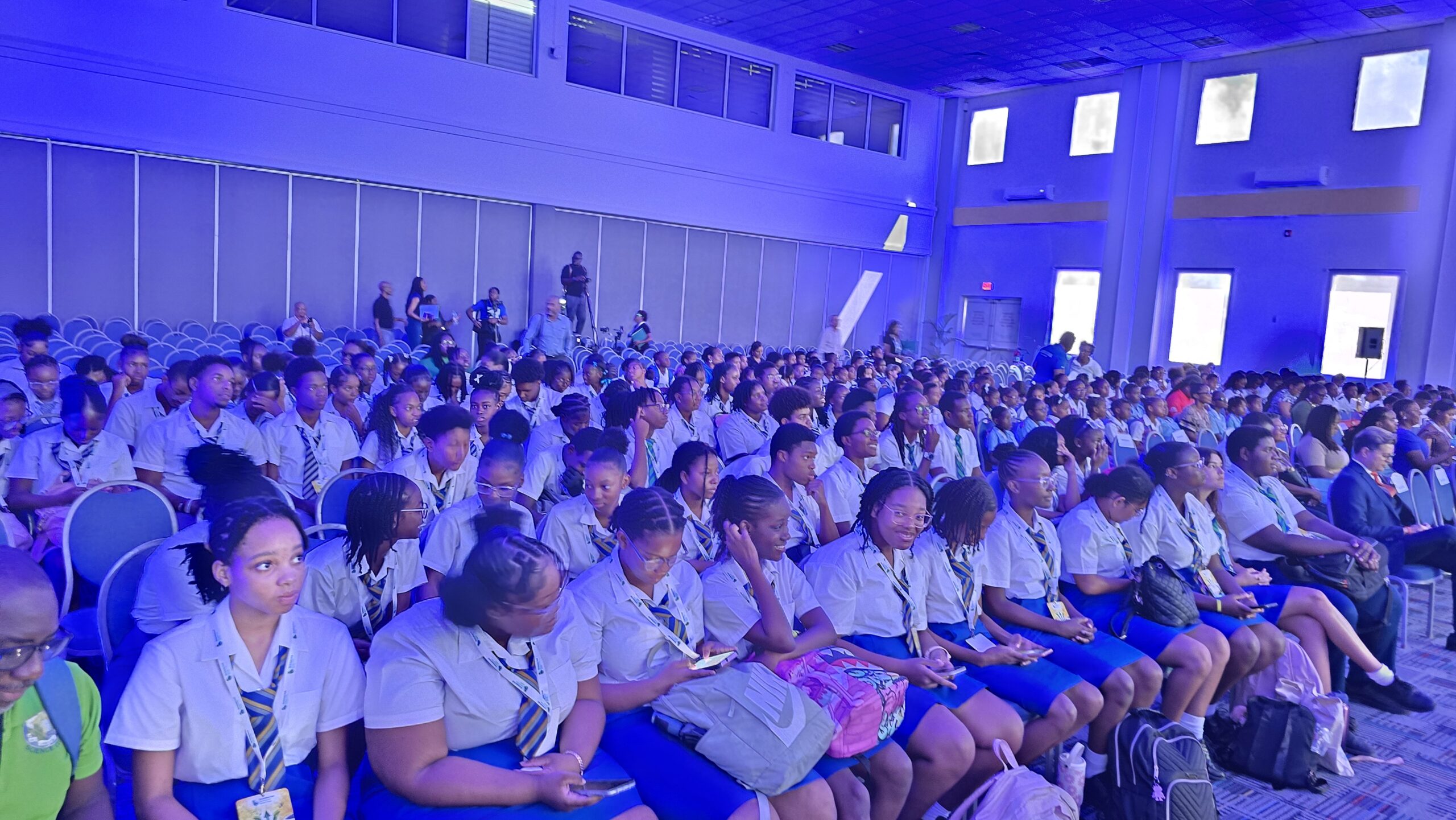High schools and first-year college students from across the Eastern Caribbean Currency Union (ECCU) are currently participating in the 3rd Annual Regional Schools Investment Competition. This innovative event, running from October 14 to November 7, 2025, offers students a unique opportunity to engage with the Eastern Caribbean Securities Exchange (ECSE) and gain hands-on experience in securities market activities. The competition aims to foster financial literacy and investment skills among young people, preparing them for future roles in the region’s financial markets. The initiative is a collaborative effort between the ECSE, the Eastern Caribbean Securities Regulatory Commission (ECSRC), and licensed broker-dealers. Participants will compete for the prestigious title of Regional Schools Investment Champion, with the competition kicking off with an Education Webinar on October 2 and a detailed briefing on October 8. Now in its third year, the event aligns with the ECSE and ECSRC’s 24th anniversary, celebrated on October 19, 2025. Updates on the competition can be found on the ECSE’s official website and social media platforms.
博客
-
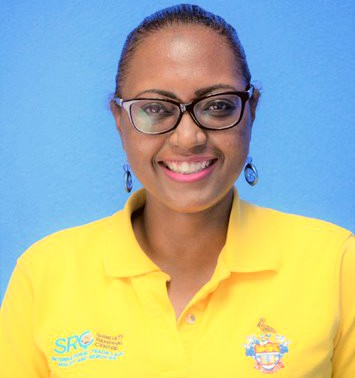
Caribbean Sea: Zone of Peace and prosperity
The Caribbean Sea, a vital lifeline for numerous sovereign nations and dependent territories, is under threat as recent US military strikes on alleged drug-smuggling boats have sparked outrage and fear across the region. Since September 2, 2025, the US Southern Command has conducted four strikes in the southern Caribbean near Venezuela, resulting in at least 21 deaths. Washington justifies these actions as part of its fight against ‘narcoterrorism,’ targeting the Venezuelan gang ‘Tren de Aragua,’ which it designated a foreign terrorist organization in February 2025. However, these strikes have raised serious concerns about sovereignty, legality, and the potential for escalating militarization in a region historically committed to peace.
The Caribbean has long been a major transshipment route for narcotics moving from South America to North America, and regional nations have cooperated with the US in counter-narcotics efforts for decades. Yet, the recent strikes are deeply intertwined with the deteriorating US-Venezuela relations, which have worsened under successive US administrations. The deployment of 4,000 US troops near Venezuela’s coast has fueled speculation of a potential regime change, prompting Venezuela to declare a state of emergency and bolster its military defenses. Colombia’s President Gustavo Petro has also condemned the strikes, noting that Colombian nationals may have been among the victims.
The UN Security Council held an emergency session on October 10, 2025, at Venezuela’s request, but meaningful action is unlikely due to the US veto power. Critics, including Human Rights Watch, have condemned the strikes as extrajudicial killings and violations of international law, with no credible evidence provided to confirm the targeted vessels were involved in drug smuggling. There are fears that the victims could have been innocent migrants or fishermen.
The Caribbean Sea, though less than 1% of the world’s ocean area, accounts for 27% of the global ocean economy and 18% of regional GDP, according to the Inter-American Development Bank. Its waters are crucial for fisheries, tourism, shipping, and other industries. Escalating military tensions threaten the region’s blue economy, which many Caribbean nations are developing through sustainable fisheries, renewable energy, and maritime transport. Increased militarization could deter investment, disrupt livelihoods, and imperil future prosperity.
Historically, the Caribbean has prided itself on being a ‘Zone of Peace,’ a principle reaffirmed by regional leaders at the 80th UN General Assembly. However, cracks are emerging in the Caribbean Community (Caricom) unity, with Trinidad and Tobago’s Prime Minister Kamla Persad-Bissessar publicly supporting the US actions. Reports also suggest the US has approached Grenada to host radar equipment, further complicating regional solidarity.
Caricom must engage diplomatically with the US, leveraging support from the Caribbean diaspora, civil society, and international allies to prevent further escalation. Over 60 US civil society organizations have expressed concerns about the legality and morality of the strikes, while senior Democrats have demanded evidence. The UN has called for restraint, emphasizing that efforts to combat transnational crime must comply with international law.
The Caribbean must unite to defend its shared patrimony, ensuring that the Caribbean Sea remains a zone of peace and prosperity. Preserving this principle is not just a diplomatic goal but a moral, social, and economic necessity.
-

GARFIN monitoring CLICO payout after court ruling
In a significant development for thousands of policyholders, the Grenada Supreme Court has approved an initial distribution of approximately EC$9.5 million to CLICO International Life (CIL) policyholders, marking a long-awaited step toward financial recovery. The decision, announced on 12 May 2025, comes 14 years after the company’s collapse in 2011, which left many Grenadian families without life insurance benefits and retirement savings. Despite this progress, the payout represents only 6.59% of the total admitted claims, which amount to EC$144.9 million. The distribution follows a small claims scheme, with claims under EC$50 receiving no payment due to high processing costs, while claims between EC$50 and EC$1,000 will be paid in full. Policyholders with claims between EC$1,000 and EC$15,576 can choose between a lump sum payment of EC$1,000 or 5.5% of their total claim amount, while claims over EC$15,576 will receive 5.5% of their claim value. The Grenada Authority for the Regulations of Financial Institutions (GARFIN) has urged policyholders to review correspondence and respond promptly if they have not received personalized letters by 31 October 2025. The Judicial Manager has also launched a dedicated website to provide updates on the ongoing judicial process, ensuring transparency and communication with affected parties.
-
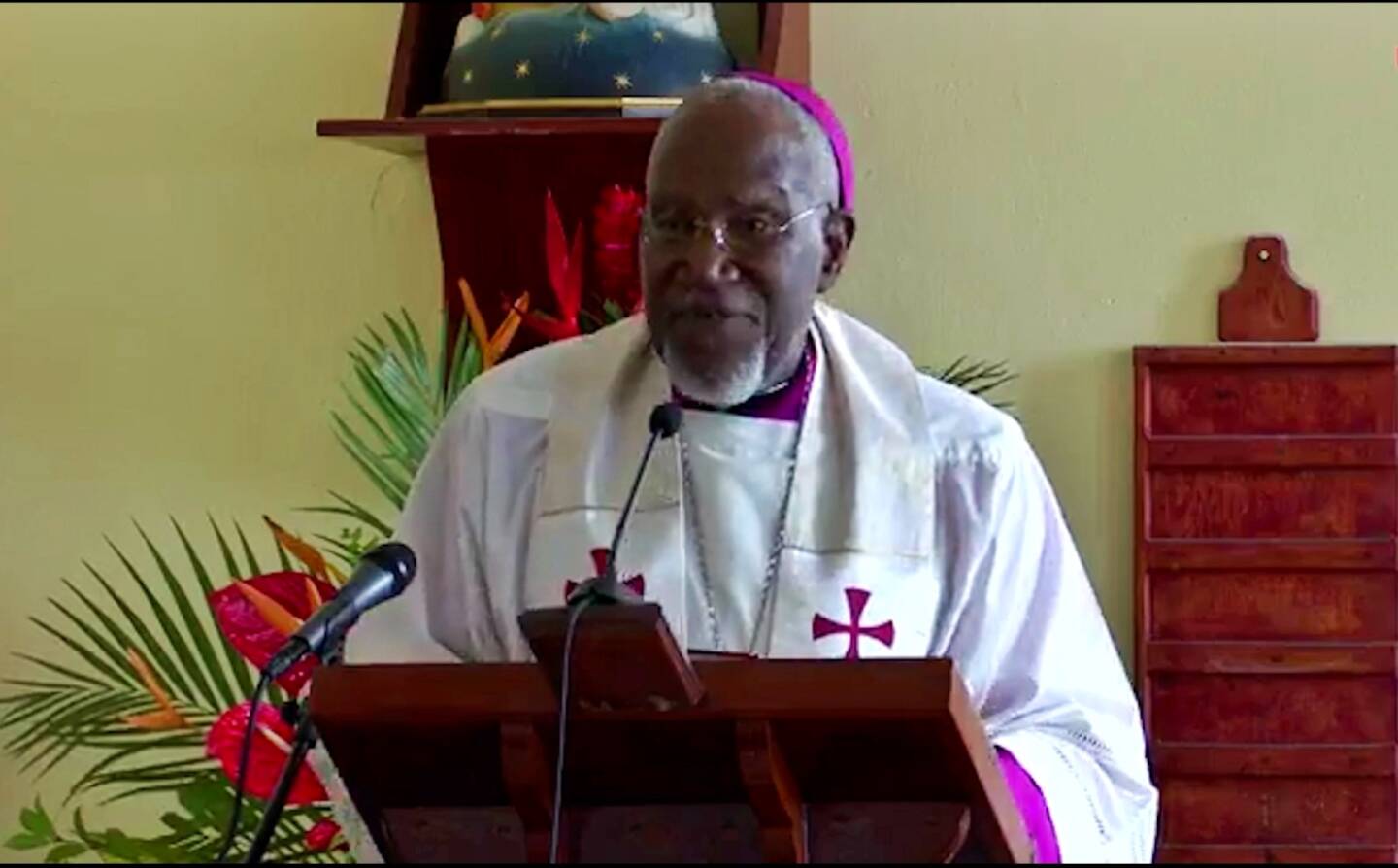
The least of these — Matthew 25:40
In his concluding address to the Good News Catholic Communications (GNCC) panel on the Age of Civil Responsibility (ACR) Bill, Bishop Clyde Harvey delivered a series of thought-provoking insights. He emphasized that the bill does not strip parents of their rights but ensures that children in need receive necessary support. Harvey highlighted that the core issue lies not in legislation but in education, pointing out the church’s diminished role in educating teenagers and parents. He debunked the Caribbean myth that parents universally discourage sexual activity, noting that some even encourage it. Harvey underscored the church’s duty to protect the vulnerable, particularly children, and concluded with a powerful appeal: ‘The bill must be withdrawn in its present form and reintroduced in the new parliamentary session, preceded by a thorough review to align it with our deeper goals, including proper family education.’ This call for responsible leadership stands in stark contrast to the pervasive silence of many religious leaders on the sexual crisis. The article questions the church’s failure to address intimate partner violence, incest, rape, and adolescent pregnancy, largely driven by adult men. It critiques the church’s deviation from its mission of love, inclusion, fairness, and justice, attributing its timidity to cultural stigmatization of sexuality. The piece invokes the legacies of Rev. Dr. Martin Luther King Jr. and Nelson Mandela, who championed justice and condemned silence. It concludes with a poignant inquiry into the absence of courageous voices among faith leaders, labeling their silence as scandalous. The article is co-signed by Tonia Frame, PhD, President of the Grenada Planned Parenthood Association (GPPA), and Fred Nunes, PhD, Consultant for Advocates for Safe Parenthood: Improving Reproductive Equity (ASPIRE).
-
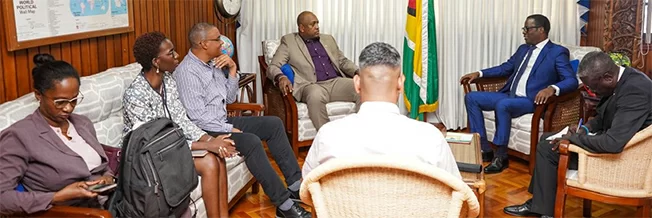
Bouva en Todd bespreken versterking van Suriname–Guyana-corridor
Suriname and Guyana have reaffirmed their commitment to enhancing bilateral cooperation across political, economic, and infrastructural domains. This pledge was solidified during a high-level meeting between Suriname’s Minister of Foreign Affairs, International Business, and Cooperation (BIS), Melvin Bouva, and his Guyanese counterpart, Hugh Todd, on Tuesday in Georgetown. The discussions took place on the sidelines of the International Business Conference, held in Guyana from October 14 to 16. The meeting built upon the recent visit of Guyanese President Irfaan Ali to Suriname’s President Jennifer Simons in September. Both ministers focused on actionable steps to implement the Strategic Dialogue and Cooperation Platform (SDCP), which serves as the framework for collaboration between the two nations. Key areas of discussion included regional integration, trade, energy, agriculture, and tourism. The ministers highlighted the strategic significance of the Suriname-Guyana corridor, which is increasingly recognized as a vital economic zone linking the Caribbean with Latin America. They pledged to actively support this development in partnership with the private sector and multilateral organizations. Specific projects addressed during the meeting included the Corantijn Bridge initiative, the revitalization of the Canawaima Ferry Service, energy cooperation with a focus on sustainable alternatives, the reactivation of the Border Commission, and the operational resumption of SDCP committees by November 1. These committees will focus on agriculture, fisheries, tourism, and energy. Both ministers agreed to hold regular consultations to monitor progress and evaluate the implementation of SDCP agreements. In a joint statement, they described the meeting as “constructive and forward-looking,” emphasizing stability, mutual benefit, and sustainable growth in the region. Minister Bouva was accompanied by Minister Andrew Baasaron of Economic Affairs, Entrepreneurship, and Technological Innovation, Ambassador Liselle Blankendal, Deputy Director Shailesh Ramsingh, and Second Secretary Lucille Starke-Esajas.
